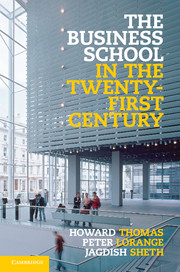Book contents
- Frontmatter
- Contents
- List of figures
- List of tables
- Preface: Tipping or tripping? The business school and its dilemmas
- Acknowledgements
- 1 The business school: history, evolution and the search for legitimacy
- 2 Business school identity and legitimacy: its relationship to the modern university and society
- 3 Rethinking management education and its models: a critical examination of management and management education
- 4 A framework for re-evaluating paradigms of management education
- 5 Evaluating new and innovative models of management education
- 6 Is the business school a professional service firm? Lessons learned
- 7 Enhancing dynamic capabilities in the business school: improving leadership capabilities in curricula and management
- 8 Afterword: business school futures
- Index
- References
8 - Afterword: business school futures
Published online by Cambridge University Press: 05 July 2013
- Frontmatter
- Contents
- List of figures
- List of tables
- Preface: Tipping or tripping? The business school and its dilemmas
- Acknowledgements
- 1 The business school: history, evolution and the search for legitimacy
- 2 Business school identity and legitimacy: its relationship to the modern university and society
- 3 Rethinking management education and its models: a critical examination of management and management education
- 4 A framework for re-evaluating paradigms of management education
- 5 Evaluating new and innovative models of management education
- 6 Is the business school a professional service firm? Lessons learned
- 7 Enhancing dynamic capabilities in the business school: improving leadership capabilities in curricula and management
- 8 Afterword: business school futures
- Index
- References
Summary
As mentioned in the Preface, this book is a sort of freeze-frame view of business schools and the management education industry at a moment in time – we cannot be sure yet if what follows will be an inelegant pratfall or a graceful recovery.
The book contains some suggestions both for how to avoid the former and embrace the latter, but the result will be in the hands of the business schools themselves and, in particular, their deans and senior faculty.
There are two key issues (among others, of course) that they will need to address:
the business model of business schools;
the impact of a globalised world.
How they handle them will have a huge influence on their future.
BUSINESS MODEL
We have pointed out here and elsewhere that the current somewhat luxurious business model employed and enjoyed by many leading business schools is potentially unstable and possibly unsustainable in the longer term.
The key is funding – where it comes from and where it is spent.
The largest percentage of business school funding has traditionally come from the state. Schools are directly funded to educate students and to produce research. The state perceives education as a public good that produces an educated workforce, which eventually should produce returns to the state through higher productivity and taxes. Equally, research is seen as generating innovation that also creates long-term public benefit.
- Type
- Chapter
- Information
- The Business School in the Twenty-First CenturyEmergent Challenges and New Business Models, pp. 267 - 271Publisher: Cambridge University PressPrint publication year: 2013

